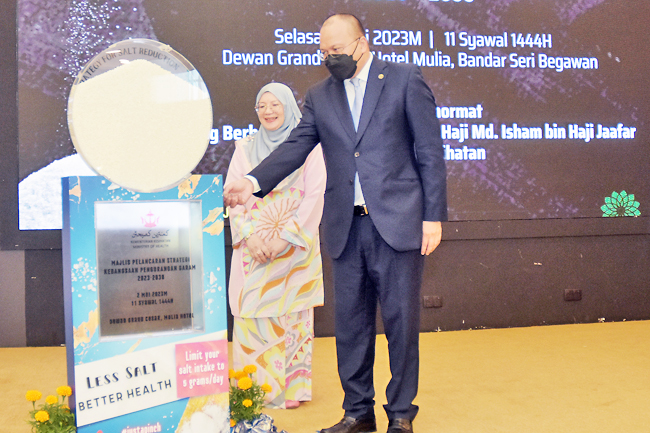James Kon
Minister of Health Dato Seri Setia Dr Haji Mohd Isham bin Haji Jaafar raised growing concerns regarding the high salt intake of the population at the launch of National Strategy for Salt Reduction yesterday.
From the National STEPS-NCD Survey 2016, he said, “It showed that salt intake in Brunei Darussalam was around 10 grammes (g) per day, which is twice the amount recommended by the World Health Organization (WHO).
“The study also found that the male population took more salt at 11.5g per day, compared to their female counterparts at 8.5g per day.“
The minister also shared a study from the Health Promotion Centre at the Ministry of Health that found 806 out of 1,470 food products in the Sultanate displayed information about salt. From the 806 products, 51 per cent of them are of high salt content. Four food products with very high salt content are bread, crackers, instant noodles and canned or packed foods.
The minister said, “Adding salt while cooking, adding soya sauce to dishes as well as adding chilli and tomato sauces while eating are among the common habits.”
He added that excessive salt intake is a major risk factor for high blood pressure, which in turn leads to cardiovascular disease (such as stroke and heart disease), kidney disease, stomach cancer and obesity.
A global study from the Lancet on unhealthy dietary risk factors and contributors to death has found that excessive salt intake was among the cause of death among two million people in 2019.

The minister added that cardiovascular diseases is the biggest cause of premature death in the Sultanate over the past decade. Findings from National STEPS-NCD Survey 2016 have shown that 28 per cent of adult in Brunei has high blood pressure. Some 30.2 per cent of men and 25.8 per cent of women have hypertension showing that men have higher risk of having cardiovascular disease.
High blood pressure can be prevented by practicing a healthy lifestyle and eating a balanced diet.
Studies have shown that reducing sodium intake has proven to be effective in preventing non-communicable diseases (NCDs).
Salt, the minister said, is the main source of sodium in food.
“World Health Organization’s (WHO) recommendation for an individual is less than five grammes per day. Findings have showed that if an individual reduced the salt intake by one gramme a day, it can lower blood pressure by an average of two millimetres of mercury (mmHg) thus reducing the incidence of stroke by 10 per cent and heart disease by five per cent. There is clear evidence that high sodium intake causes higher blood pressure.”
Dato Seri Setia Dr Haji Mohd Isham said salt intake reduction plays a vital role in protecting people from the burdens of NCDs.
“According to WHO, reducing sodium intake is one of the most cost effective ways to improve health. Tradition and cultural factors play roles in high sodium intake, such as the frequent use of salt seasonings and flavourings such as soya, chilli and tomato sauces in daily cooking.”
The minister said the consumption of processed food is increasing due to affordability.
“Lately, there has been an increase in the consumption of processed foods, such as snacks as well as canned and fast food with high salt content.
“Government policies are required to enable the populace to eat quality, healthy and nutritious food with low salt content. Steps include requiring food businesses to produce and make available healthier foods at an affordable price; having healthier options on the menu; low-salt product availability; increasing awareness on the importance of reducing salt through social marketing; creating a conducive environment for reducing salt in school, workplace and community; and continuous monitoring of salt intake in the populace.
“There is a need for behavioural changes with choosing to buy and consume low-salt products; refrain from adding salt while cooking; and avoiding additional seasonings such as soya sauce. Businesses, on the other hand, should explore innovation in the food manufacturing process.”
Taking into account the recommendations from WHO, Dato Seri Setia Dr Haji Mohd Isham said, “The Ministry of Health has designed the National Strategy for Salt Reduction to contain actions for government agencies and stakeholders as guidelines aimed at achieving the national target of 15-per-cent reduction in salt intake by 2030.”
The minister said the majority of the measures are not in the health sector therefore having a better eating habit is the responsibility of society as well as individuals, adding that whole-of-nation and whole-of-society approaches are required in realising the necessary changes.
The main players are the food industry and education as well as financial and health sectors that Dato Seri Setia Dr Haji Mohd Isham believes are in identifying gaps, combining related issues and ensuring the implementation of relevant measures to achieve the target by 2030.







